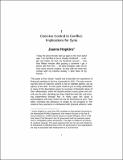Files in this item
Coercive control in conflict: implications for Syria
Item metadata
| dc.contributor.author | Hopkins, Joanne | |
| dc.coverage.spatial | 24 | en_US |
| dc.date.accessioned | 2019-04-19T15:45:38Z | |
| dc.date.available | 2019-04-19T15:45:38Z | |
| dc.date.issued | 2018-11-14 | |
| dc.identifier.citation | Hopkins, J. (2018). Coercive control in conflict: implications for Syria. Syria Studies, 10(1), 1-24 | en_US |
| dc.identifier.issn | 2056-3175 | en_US |
| dc.identifier.uri | https://ojs.st-andrews.ac.uk/index.php/syria/article/view/1690 | en_US |
| dc.identifier.uri | https://hdl.handle.net/10023/17558 | |
| dc.description.abstract | In Coercive Control in Conflict: Implications for Syria, Joanne Hopkins explores how the concept of coercive control can be used to help us understand the continuum of violence experienced by men and women in the Syrian conflict. Hopkins moves beyond what most similar studies focus on, “… the use of physical violence by the state ….” and “… the state's systematic use of torture, imprisonment and rape …” and focuses instead on the “… need to understand the way that the state and other actors have employed a strategy of creating an atmosphere of fear alongside the physical acts of violence.” | en_US |
| dc.language.iso | en | en_US |
| dc.publisher | Centre for Syrian Studies, School of International Relations, University of St Andrews | en_US |
| dc.relation.ispartof | Syria Studies | en_US |
| dc.rights | Copyright 2018 the Author. | en_US |
| dc.rights | Attribution 4.0 International | * |
| dc.rights.uri | http://creativecommons.org/licenses/by/4.0/ | * |
| dc.subject.lcc | DS92.S9 | en_US |
| dc.subject.lcsh | Syria | en_US |
| dc.title | Coercive control in conflict: implications for Syria | en_US |
| dc.type | Journal article | en_US |
| dc.description.version | https://doi.org/Publisher PDF | en_US |
| dc.publicationstatus | Published | en_US |
| dc.status | Peer reviewed | en_US |
The following licence files are associated with this item:
This item appears in the following Collection(s)
Except where otherwise noted within the work, this item's licence for re-use is described as Attribution 4.0 International
Items in the St Andrews Research Repository are protected by copyright, with all rights reserved, unless otherwise indicated.


